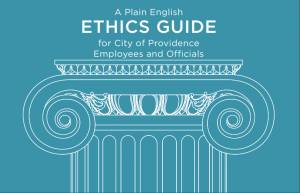Click on the topic you are interested in to get further detail.
Employees
Example:
Using department copier and paper to reproduce the little league schedule for your own convenience is improper. Please note that there are specific ordinances and/or departmental policies that address use of City vehicles, City cell phones, and other City property. It is important to check with your department for details regarding these policies. However, in the absence of such an ordinance or departmental policy, this provision applies.
You may not sell, buy, or use any document that fraudulently bears the City seal. Code § 17-33(c)(3)
Example:
Your new neighbor blasts loud music from his stereo each night. You decide to send him a letter bearing the City seal informing him that he is violating the noise ordinance. This is unethical.
Example:
Threatening to fire an employee in charge of ordering paper supplies if he/she does not order from Killing Trees Happily, Inc. is improper.
You may not use your position for the purpose of gaining a benefit for yourself or someone else. Code § 17-33(c)(5)
Example:
You are an inspector for the Department of Inspections and Standards. You call a local restaurant asking for a dinner reservation for Saturday. You are told that there are no reservations available. You tell them who you are and remind them that their restaurant is scheduled to be inspected in the next couple of weeks and ask them to double-check. This is a misuse of your position.
You may not disclose confidential or privileged information gained through your employment with the City. Code § 17-33(c)(6)
Example:
Working with the retirement board, you review Sheriff Rosco P. Coltrane’s medical records and discover that he suffers from a terrible case of scurvy due to his disgust with fruits and vegetables. You may not disclose this information to the Dukes or other persons.
You may not knowingly employ someone who does not show up for work; shows up for work, but does not perform his/her duties; or gets paid an amount of money grossly disproportionate to the tasks he/she does perform. Code § 17-33(c)(7)
You may not conduct any outside business, including non-compensated business, during the regular hours of your City position. Code § 17-33(c)(8)
Example:
You are scheduled to attend your child’s PTA meeting at 3:00 p.m., but your regular business hours do not end until 4:30 p.m. In order to attend, you should discharge personal time, or, if it is available, discuss compensation time with your supervisor.
You may not, either directly or indirectly, give, promise, or pay any money, service, or other things of value to anyone for the purpose of obtaining a promotion or employment with the City. Code § 17-33(c)(4)
You may not represent, advise, consult, or assist any person or entity in connection with a matter:
Example:
It is unethical to offer to babysit your supervisor’s bratty kids for an entire month for the purpose of getting a promotion.
Former Employees
You may not represent, advise, consult, or assist any person or entity in connection with a matter:
- in which the City/municipal agency is a party or has a direct substantial interest; and
- in which you participated personally and substantially in your capacity as a City official/employee; and
- which involved a specific party/parties at the time of your participation; and
- which is the same matter in which you participated as a City official/employee
Example:
As a member of the zoning board, you voted on Dr. Jeckyll’s application for a use variance to operate a lab in a residential area. Dr. Jeckyll’s application was denied and he appeals to Superior Court, naming the zoning board as a party. It would be unethical to represent, advise, consult, or assist Dr. Jeckyll with his appeal of the zoning decision.
A former employee/official of the City who participated personally and substantially in a negotiation or supervised a negotiation, of a municipal contract, grant, or subsidy cannot accept employment with a party to the contract or the recipient of the grant or subsidy for a period of one (1) year after the contract is signed or the grant or subsidy is awarded. Code § 17-33(d)(3)
A former employee/official of the city cannot disclose confidential or privileged information acquired during service as employee/official unless authorized by law. Code § 17-33(d)(4)
Campaign Ethics
An employee of the City cannot take an active part in political management or campaigns during duty hours. Code § 17-33(e)(1)
An employee of the City, while wearing a uniform required for his or her employment, cannot solicit support for any candidate or request that an individual contributes any time, money, or other things of value to a candidate, political party, or political measure. Code § 17-33(e)(2)
It is unlawful for any person to solicit political contributions from employees of the City during the employee’s hours of employment. Code § 17-33(e)(5)
It is unlawful for any person to solicit or knowingly accept any campaign contribution in a City facility. Code § 17-33(e)(4)
AIDING AND ABETTING
SUSPENSION OR DISMISSAL
Upon being formally charged with a felony directly related to his or her employment, a City employee may be suspended with or without pay, or transferred to another position. Code § 17-33(f)
A City employee shall be dismissed immediately upon conviction of or plea of nolo contendre to a felony related to his or her employment. Code § 17-33(g)
PENALTIES AND ENFORCEMENT
A violation of the City’s Code of Ethics can have serious consequences, including loss of employment, civil fines, and incarceration.
REVOLVING DOOR
The City’s and State’s codes of ethics both contain revolving door provisions — provisions that address moving from one position within the City to another. The following is a brief overview of both:
Municipal elected officials and school committee members may not seek or accept employment within any municipal agency of the municipality in which they serve, other than that held at the time of the election, while in office and for a period of one (1) year after leaving office. However, a municipal elected official or school committee member may seek election to any other elective office.
Elected and appointed officials may not accept appointment or election to positions that carry any financial benefit that requires approval by the body of which they are a member, while serving as a member of that body and for a period of one (1) year thereafter.
CONFLICTS OF INTEREST
You have a conflict of interest if it is reasonably foreseeable that a decision you are helping to make as part of your public duties:
- Will result in a financial benefit or detriment to:
- You, our family or household member, Your outside employer, or your business associate.*
OR, even if there is no financial impact, if a family member, household member, employer, or business associate is a party to, or is participating
in, the matter being discussed.
* A business associate is any person or entity with whom you are joined to achieve a common financial objective. Your business associates are not only your business
partners but also people you have hired as attorneys, accountants, realtors, contractors, etc. Your business associates are also any businesses or organizations,
even if not-for-profit, for which you are an officer or director.
Merely having a conflict of interest is not a violation of the Rhode Island Code of Ethics. It is what you do after you identify a conflict of interest that matters.
If you identify a conflict of interest, you must take the following steps:
- Recuse: meaning, do not participate in any aspect of the work or decision-making relating to the matter; and
- Complete a Statement of Conflict of Interest form, and
- Present the original to your supervisor, and
- Send a copy to the Rhode Island Ethics Commission; and
- Inform your supervisor: if it is necessary that another person handle the matter, you cannot reassign it yourself. Rather, you must inform your supervisor so that he or she can reassign it.
Avoid the appearance of impropriety.
Even if you do not believe that you have a conflict of interest, as defined by the State’s Code of Ethics, but you believe nonetheless that your participation in the matter would create an appearance of impropriety, you should still recuse and follow the procedures outlined above.
Perhaps the most common variation on the conflict of interest theme is the prohibition pertaining to gifts.
You may not accept from an interested person:
- A gift of cash, debt forbearance, or debt forgiveness in any amount; or
- A gift of goods or services having either a market value or actual cost greater than $25; or
- Multiple gifts in one calendar year having an aggregate market value or actual cost of greater than $75.
* An interested person is a person, business, or representative that has a direct financial interest in a decision that you participate in making. There are limited exceptions to these gift prohibitions. When in doubt, consult materials prepared by the Rhode Island Ethics Commission and/or seek additional advice.
Additional conduct covered by the Rhode Island Code of Ethics in Government:
- Nepotism and Favoritism
- Honoraria
- Outside Employment
- Acting as Agent or Attorney
- Appearances before your own Agency
- Revolving Door
- Contracts with State or Local Government
- Transactions with Subordinates
The overview provided in this handbook is by no means meant to be exhaustive. Rather, it is intended to bring issues to your attention for your own independent and
further exploration. You are strongly encouraged to familiarize yourself with the resources available on the Rhode Island Ethics Commission website: www.ethics.ri.gov.
Consult with your Board’s or Commission’s counsel (if applicable).
Contact the City’s Municipal Integrity Officer for informal, confidential advice.
Submit a request in writing to the Providence Ethics Commission for a formal advisory opinion.
Contact the Rhode Island Ethics Commission for informal advice.
Submit a request in writing to the Rhode Island Ethics Commission for a formal advisory opinion.


